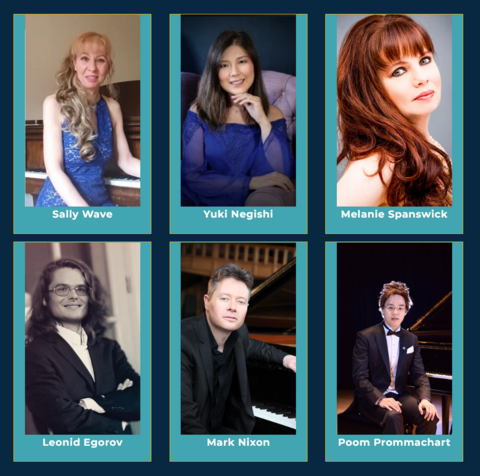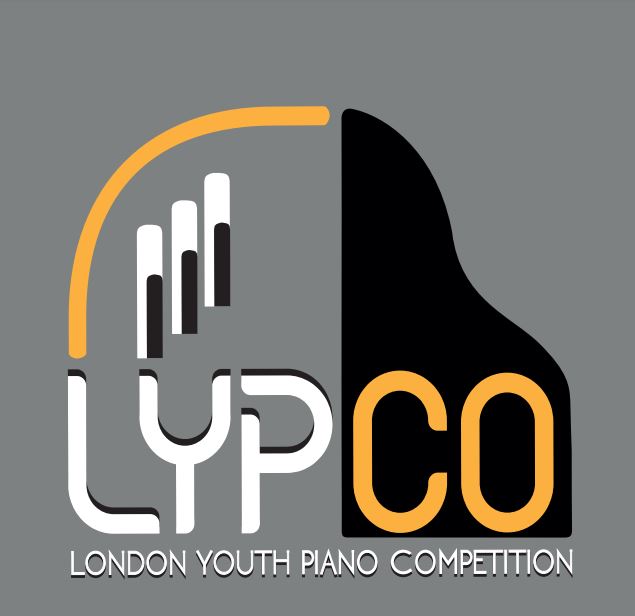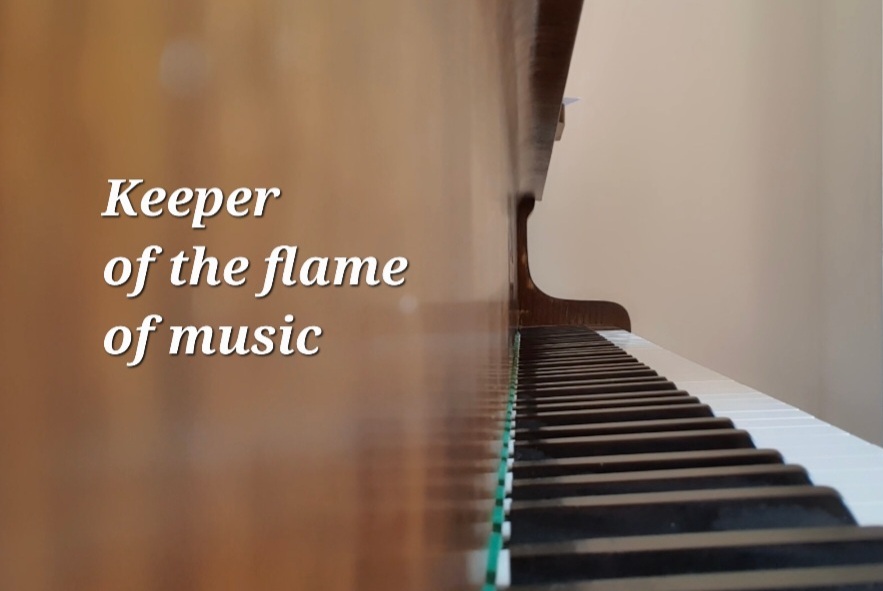
By James Brewer
Outstanding talents… young artists ready to compete in the biggest International piano competitions and play in leading concert halls… admiration for all 272 participants, mostly aged between eight and 18, from across the globe, with some promising contestants as young as five.
These are among the highlights from the latest London Youth Piano Competition, the 2022 edition, with the prize-winners now announced. Its success has ensured that the annual online LYPCO, as it is known for short, continues to be a celebrated event in the international piano calendar.
The competition is flourishing in a new form after the pandemic shut down live events for a time. “Our world has changed. We shall keep in step,” said LYPCO founder and musical director Dr Sally Wave (https://lypco.co.uk/portfolio-items/sally/), who participated in adjudicating alongside five other distinguished panellists. Dr Wave, who was a co-founder of a predecessor event, Wimbledon International Piano Competition, declared: “This year, 272 participants from 38 countries have shown what they can do. Where else in this field is to be seen such a palette of nationalities? If we returned to holding the competition in a traditional venue setting venue, we would have representation from just a few countries – not to mention a much smaller audience!

“An online event also means that the adjudicators are free to spend more time listening to the competitors and voting in between their concerts and other commitments.”
Dr Wave said: “I would like to underline that this year we have had participants from Russia and Ukraine. Our competition is not closed for Russian children and young people. We will never agree that musicians should be involved with political issues. The music stays higher than any such factors. Any discrimination regarding race, religion, political views, or gender is not supported by LYPCO.
“Thus, Ukraine was represented by a brave girl, who is far away from home, but keeps the flame of music alive. Such is our goal and mission – to cherish the flame of music and support everybody who has these principles.”

LYPCO expanded the concept of the original Wimbledon competition, with new formats and categories, offering both younger and more experienced pianists the opportunity to display their talents through the medium of technology in front of a global audience. The judges award platinum, gold, silver, and bronze medals in each category and at their discretion additional prizes. Platinum winners received cash prizes. Each participant receives a certificate as a valuable addition to their portfolio.
For 2022, LYPCO opened a non-competitive category to encourage all those who have never entered a competition before to try their hand. Six little children made their debut in this section, and, said Sally Wave, “I dare say, their level of performance was of a very good standard. I would like as well to congratulate the two participants who won a prize for the best performance at the age of five. To be honest, I and my colleagues were very much surprised that at that age they already were playing pieces from Grade 2 (an early intermediate stage of the Associated Board of the Royal Schools of Music). What a start they have made, showing a real talent for music!”

The adjudicators, in addition to Dr Wave, are acclaimed performers and educationalists: Mark Nixon, Leonid Egorov, Melanie Spanswick, Yuki Negishi and Poom Prommachart. Here were some of their reactions, interspersed with feedback from young competitors:
Overall impression of the standard of competitors:
Leonid Egorov (https://lypco.co.uk/portfolio-items/leonid-egorov/) : Some are very professional; some are very unprofessional. But that’s the main point. The LYPCO competition attracts different participants. Our competition is open to piano amateurs (a separate category has been created for them) as well as professionals, and some of them can already be real pianists, despite their young age.
Poom Prommachart (https://lypco.co.uk/portfolio-items/poom-prommachart/) : The competition was smooth throughout. Each candidate has their own character, and they communicated the message of their selected pieces clearly, even though the competition was online.
Yuki Negishi (https://lypco.co.uk/portfolio-items/yuki-negishi/) : I was impressed by the high level and standard of the pianists this year. There were 12 platinum awards, and the jury does not bestow such awards lightly – they are only for those who moved us unanimously. In addition, there were 21 gold medals awarded. Any of these pianists can grace the world stages of international platforms.
Melanie Spanswick: The standard was extremely high in nearly all the categories that I judged, but particularly in the non-examination classes.
 Kelvin Jou from the US, a winner in the age 16-18 non-music school category said: “I am honoured to be one of the platinum winners for this year’s LYPCO 2022 competition. It was a rewarding experience despite the hardships and stress I faced while recording.”
Kelvin Jou from the US, a winner in the age 16-18 non-music school category said: “I am honoured to be one of the platinum winners for this year’s LYPCO 2022 competition. It was a rewarding experience despite the hardships and stress I faced while recording.” 
How important is the geographical reach of LYPCO? Did any countries stand out this year for the quality of entrants?
Melanie Spanswick (https://lypco.co.uk/portfolio-items/melanie-spanswick/) : Those participants from Far Eastern countries always stand out, irrespective of the competition! That part of the world takes piano study and music education very seriously. China, Hong Kong, Taiwan, and Singapore often produce outstanding young students, and there were many excellent performers from these countries this year.
Yuki Negishi: The reach of LYPCO is truly global – the highest numbers of entrants came from the UK, China, and the US. But like last year, there is a strong interest from many Asian countries, in particular Thailand, and the level of their teaching and students are astonishingly high. Singapore, Indonesia, Hong Kong, and Japan also provided high-level entrants this year. New Zealand had many entrants, an origin which was new, and Belgium stood out from the European countries in terms of applicant numbers.
Poom Prommachart: The reach includes pianists from different continents. I am delighted to have discovered some outstanding talents from my home country, Thailand. Most of the contestants from the UK presented well too.
Leonid Egorov: I think the LYPCO competition is unique. And its geographic reach will expand over time. Naturally, the most talented participants, like Mio Nakamura from Japan or Maria Virki from Latvia, will contribute. Because real talent is always contagious.
 Satoshi Kamada from Japan who competed in the 9 to 10 years old category said: “It was a very valuable experience to participate in LYPCO, where I could compete with rivals from all over the world without having to go abroad. I am proud to have won the platinum award at this competition.”
Satoshi Kamada from Japan who competed in the 9 to 10 years old category said: “It was a very valuable experience to participate in LYPCO, where I could compete with rivals from all over the world without having to go abroad. I am proud to have won the platinum award at this competition.” 
What are the pluses and minuses of adjudicating online compared with judging ‘live’?
Yuki Negishi: I was impressed by the continuing popularity of online competitions – which are ongoing, and seemingly growing stronger ever since the Covid pandemic. The pluses are, with the power of the internet, it can reach thousands more people and offer opportunities to those who wouldn’t be able to travel to participate in a live international competition. There are no travel or accommodation costs involved so it is obviously cheaper to participate. As a result, it is a truly global event, and the jury have the privilege of hearing pianists from places from which we would not be able to, if held live.
The minuses are the qualities of the recording equipment, pianos and the varying studio and hall acoustics. Unfortunately, those who don’t have easy access to a first-class venue or piano cannot provide the best quality recording. The jury listen only to the quality of the playing, but it is, of course, preferable to have the best environment and recording quality. Therefore, the results may be different from a live competition situation, where everyone plays under the same conditions. One point I would add is, do please have the piano tuned before recording. There were quite a few entries on untuned pianos, and though this does not reflect on the pianists themselves, it is always better if the pianos are in tune!
Melanie Spanswick: I really enjoy adjudicating online as I can do it at a time to suit myself and in my home. Minuses include sound quality, which is obviously varied as is the quality of the pianos on which students are playing. But among the benefits is that there will be a larger number of participants because of the ease and convenience of entry, as well as the fact that students don’t need to travel to take part.
Leonid Egorov: I wouldn’t want to focus our attention on the minuses. Of course, live judging is always a priority, as is live performance. But today we live in the digital age, where communication, speed, simplicity take over. After all, it’s great to be able to communicate with people wherever they are.
 Maria Virki of Latvia who took part in the category for music school students from 16 to 18 years old said: “The London Youth Piano Competition is a great opportunity to participate remotely. Personally, I was pleased that the competition is held in the summer months. I did not have time to participate in competitions during the school year and I wanted to catch up. And did not regret it! I was pleasantly surprised by the clear organisation of the competition and pleased with my results. I received a prize and a diploma, which has taken a place in my archive.”
Maria Virki of Latvia who took part in the category for music school students from 16 to 18 years old said: “The London Youth Piano Competition is a great opportunity to participate remotely. Personally, I was pleased that the competition is held in the summer months. I did not have time to participate in competitions during the school year and I wanted to catch up. And did not regret it! I was pleasantly surprised by the clear organisation of the competition and pleased with my results. I received a prize and a diploma, which has taken a place in my archive.” 
Which category was for you the most outstanding?
Poom Prommachart: Each category is unique. If I must select one, I would like to praise the young pianists’ category. They presented very well despite their young age and displayed a high level of understanding.
Melanie Spanswick: From the categories that I judged, probably the most outstanding performers were those in classes such as the 9-10 and 11-12 age groups, as this is the age when students often begin to really flourish while they still have the time to practise before the demands of schoolwork take over.
Yuki Negishi: For me, the 9-10 years, 16-18 years from non-music schools and the 19-25 years (music school) categories were the most impressive. These young artists are ready to compete in the biggest International piano competitions and play in the most important concert halls. It is exciting to see the dedication and talents of these young age groups! Good luck to all of them!
 Clementine Abbygail Shefory from Indonesia who was in the Grade 5 category, said: “I really enjoyed taking part in this competition. My understanding of all the necessary requirements was greatly improved by the clear information on the LYPCO website. The assistance they offered was excellent, courteous, and friendly when I had questions. Overall, the experience was wonderful, and I am glad to have received a platinum award.”
Clementine Abbygail Shefory from Indonesia who was in the Grade 5 category, said: “I really enjoyed taking part in this competition. My understanding of all the necessary requirements was greatly improved by the clear information on the LYPCO website. The assistance they offered was excellent, courteous, and friendly when I had questions. Overall, the experience was wonderful, and I am glad to have received a platinum award.” 
What role does a competition of the quality of LYPCO play in encouraging young students to improve their playing to the next level?
Yuki Negishi: I think a competition like LYPCO helps immensely in improving the playing of the young pianists. To make a satisfactory recording involves not only perfecting the pieces, but also re-recording the programme many times to give the best possible result. This is exactly the process involved in a professional recording scenario. One learns from watching and listening to oneself many times as well. And LYPCO, being held in London, a great cultural city, attracts the best talents from around the world!
Leonid Egorov: It’s very simple: we, the LYPCO adjudicators, always give hope for a new breakthrough. Because we have no losers. Any participant can aspire to get a gold or platinum award. Even if they didn’t make it in 2022. This is the goal of LYPCO, not to focus on a pianist’s weaknesses, and to give all competitors hope of winning the next year.
Melanie Spanswick: All performance opportunities are important for young students. They need as much practice at performing and presenting themselves as possible, and therefore a competition such as LYPCO provides a very good platform for this.
Poom Prommachart: I hope to see a wider reach-out next year. This competition is a good avenue for talents to explore themselves and receive feedback, internationally, so that they can do better in their future presentations.
Mark Nixon (https://lypco.co.uk/portfolio-items/mark-nixon/) praises the dedication of piano teachers throughout the world who have enabled their students to shine in day-to-day classwork and in competitions.
 Clive Terrence Wijaya from Indonesia, who entered in the 9 to 10 years old category said: “I’m so happy and grateful that I can join LYPCO this time. I got the chance to share my music with people around the world. It’s such a great experience for me.”
Clive Terrence Wijaya from Indonesia, who entered in the 9 to 10 years old category said: “I’m so happy and grateful that I can join LYPCO this time. I got the chance to share my music with people around the world. It’s such a great experience for me.” 
 Another student from Indonesia, Jelica Angelline Zecy Yang, who took platinum in the category for those aged 9 to 10 years, wrote: “Thank you for organising this prestigious event for the young musicians to grow especially when the pandemic Covid-19 is still around. This competition is very well organised and highly competitive, with a line of world class pianists as the distinguished jury members.” She quoted Albert Einstein; “Learn from yesterday, live for today, hope for tomorrow. The most important thing is not to stop questioning,” adding: “The competition is a part of my musical journey – strive to accomplish each deadline and to prepare my best for it and never stop learning because music is a just like a language, a never-ending learning journey.”
Another student from Indonesia, Jelica Angelline Zecy Yang, who took platinum in the category for those aged 9 to 10 years, wrote: “Thank you for organising this prestigious event for the young musicians to grow especially when the pandemic Covid-19 is still around. This competition is very well organised and highly competitive, with a line of world class pianists as the distinguished jury members.” She quoted Albert Einstein; “Learn from yesterday, live for today, hope for tomorrow. The most important thing is not to stop questioning,” adding: “The competition is a part of my musical journey – strive to accomplish each deadline and to prepare my best for it and never stop learning because music is a just like a language, a never-ending learning journey.” 
Plans for LYPCO 2023 are advanced, with booking from the beginning of May and closing on July 10. Categories will include Grades 1 to 8 and diploma, free choice, piano concerto, and piano duets.
Composer of the year will be Sergei Rachmaninoff, marking the 150th anniversary of his birth.
The organisers will open a YouTube channel, where the participant with the most ‘likes’ will be ranked as the best in their category. “We think this will add a fresh angle to the competition and the audience will have a voice as well,” said the organisers. “Equally this YouTube plan will avoid mistakes in captions by some participants which have necessitated lots of emails forwards and backwards sorting this out.”
LYPCO will announce in early 2023 a featured contemporary composer, as a gesture of support for the musicians of today. “Together with celebrating an established composer from the past, we shall always present someone who continues to be active in finding new ways to create. Cash prizes will be awarded for the best performances of the composer in question,” said the organisers.
A further new venture for LYPCO 2023 will be the offer of master classes with the distinguished adjudicators.
London Youth Piano Competition welcomes sponsorship which will be celebrated in the competition promotional material and souvenir programme. Adverts for businesses and organisations will be available in the brochure; or donations may be made using the bank details at www.lypco.co.uk, where all the latest news is posted.
LYPCO founder Sally Wave concluded that in the face of difficulties, “musicians refuse to let their spirits be dragged down. As in all ages, music will lift the heart. We will succeed in going through the darkness if we hold fast to the flame of music like a torch to show us a better way and soothe our hearts with the beauty of sound.”





